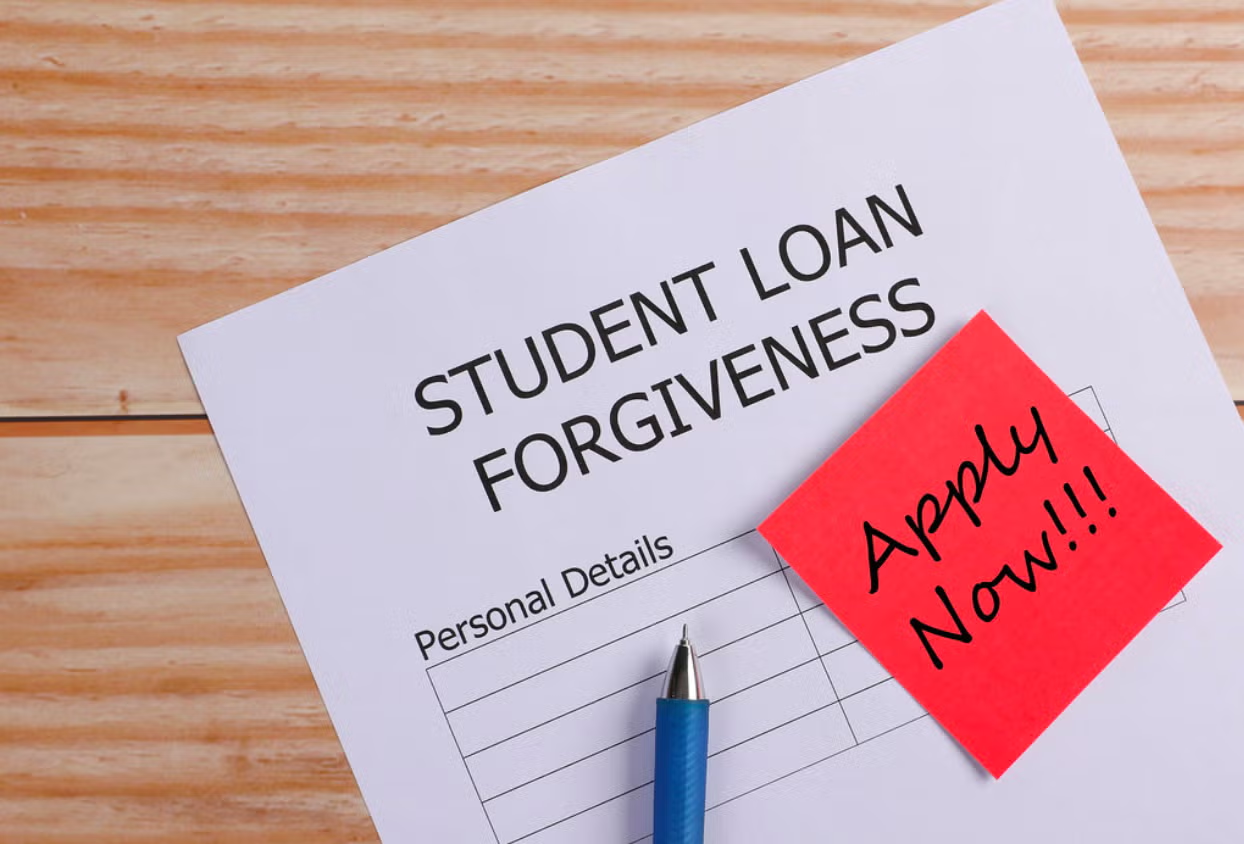Military families face unique challenges, especially when it comes to managing finances. One of the significant financial burdens many military spouses face is student loan debt. Fortunately, military spouses in Georgia may be eligible for various student loan forgiveness and assistance programs designed to ease the burden of student loans. If you’re a military spouse wondering if you can get student loan forgiveness in Georgia, the good news is that there are several ways to qualify for forgiveness or financial assistance.
In this guide, we will cover the most relevant student loan forgiveness programs available for military spouses, how to apply, and what steps you can take to make the most of these opportunities.
1. Public Service Loan Forgiveness (PSLF)
The Public Service Loan Forgiveness (PSLF) program is one of the most popular and accessible options for student loan forgiveness for military spouses, especially those working in public service jobs.
How Does PSLF Work?
PSLF offers forgiveness of your remaining federal student loan balance after making 120 qualifying monthly payments (typically over 10 years) while working for a qualifying public service employer. The types of employers that qualify include government agencies (federal, state, or local), nonprofit organizations, and certain public schools.
Military spouses who work for qualifying employers—such as government entities or nonprofit organizations—can benefit from PSLF. It’s important to note that the program is specifically for federal student loans, including Direct Loans, Direct Consolidation Loans, and Federal Stafford Loans. If you have other types of federal loans (e.g., Federal Family Education Loans (FFEL)), you can consolidate them into a Direct Consolidation Loan to make them eligible for PSLF.
Steps to Apply for PSLF:
- Check Employer Eligibility: Ensure that your employer qualifies for PSLF. You can check the Federal Student Aid website or use the PSLF Help Tool to confirm this.
- Enroll in an Income-Driven Repayment Plan: To maximize your payments toward PSLF, you need to enroll in an income-driven repayment plan, which adjusts your monthly payments based on your income.
- Make 120 Qualifying Payments: You need to make 120 on-time monthly payments under a qualifying repayment plan while working full-time for a qualified public service employer.
- Submit PSLF Certification: Submit your PSLF certification form annually or whenever you switch employers. This form allows you to confirm that your employment qualifies for PSLF and that your payments count toward forgiveness.
- Apply for Forgiveness: After making 120 qualifying payments, you can apply for loan forgiveness. The remaining balance on your federal student loans will be forgiven.
PSLF is an excellent opportunity for military spouses working in public service positions, especially as Georgia has many nonprofit and government entities where military spouses can seek employment.
2. Servicemembers Civil Relief Act (SCRA)
The Servicemembers Civil Relief Act (SCRA) is another program that can help military spouses reduce the financial burden of student loans. Although the SCRA is primarily designed to provide relief to active-duty service members, military spouses can benefit from certain provisions under the law, particularly in regard to student loans.
How Does the SCRA Help Military Spouses?
Under the SCRA, military spouses can request a reduction in the interest rate on their student loans to 6% per year during the period of their spouse’s active duty service. The law allows for a reduction in the interest rate to provide financial relief during deployment or other circumstances requiring military service.
This reduction applies to federal student loans and, in some cases, private student loans. However, it’s important to note that you must request this reduction from your loan servicer and provide proof of your spouse’s active-duty status.
Steps to Apply for SCRA Relief:
- Check Eligibility: Ensure your spouse is an active-duty service member.
- Notify Your Loan Servicer: Contact your loan servicer to request a reduction in your student loan interest rate. Be prepared to provide documentation of your spouse’s active-duty status, such as a copy of their orders or a statement from the military.
- Request a 6% Interest Rate Cap: Once your loan servicer confirms your eligibility, they should reduce your interest rate to 6% on qualifying loans for the duration of your spouse’s active-duty service.
- Monitor Payments: Keep track of your payments to ensure the reduced interest rate is applied correctly.
The SCRA interest rate reduction can be a helpful way for military spouses to lower their monthly payments and reduce the total interest paid on student loans, especially if their spouse is deployed or on active duty.
3. MyCAA Scholarship Program
The My Career Advancement Account (MyCAA) is a program specifically designed to help military spouses pursue education and career advancement. This program offers financial assistance for tuition, fees, and other related expenses for pursuing certifications, licenses, or associate degrees in fields that offer portable careers—careers that can easily move with you as you relocate due to military duties.
How Does MyCAA Work?
The MyCAA program offers up to $4,000 in financial assistance for military spouses pursuing education in specific career fields, such as healthcare, information technology, or business. The goal of MyCAA is to support military spouses by providing financial help for training that leads to careers that can travel with them, no matter where the military sends them.
Steps to Apply for MyCAA:
- Check Eligibility: MyCAA is available to spouses of active-duty service members in pay grades E1 to E5, W1 to W2, and O1 to O2. You can check your eligibility through the MyCAA website or by contacting a MyCAA program counselor.
- Create an Account: To apply for MyCAA, you will need to create an account on the MyCAA website and fill out the necessary forms.
- Choose a Program of Study: Choose an approved program of study, which must lead to a portable career. The program must be offered by a participating educational institution.
- Submit Application: After selecting a program, submit your application for financial assistance. Make sure to include all the necessary documents and information.
- Complete Your Education: Once approved, you can use the funds to pay for tuition, books, and other educational expenses. After completing the program, you can start your new career!
4. Georgia HERO Scholarship Program
The Georgia HERO Scholarship Program provides financial assistance to spouses of military service members who were killed or permanently disabled in the line of duty. This scholarship covers tuition costs for those pursuing higher education at Georgia’s public universities, technical colleges, or private institutions.
How Does the Georgia HERO Program Work?
If you are the spouse of a service member who was killed or permanently disabled in the line of duty, you may qualify for the Georgia HERO Scholarship. This scholarship can cover the cost of tuition, as well as other fees, for eligible education programs within the state.
Steps to Apply for the Georgia HERO Scholarship:
- Check Eligibility: You must be the spouse of a service member who was killed or permanently disabled in the line of duty. Specific eligibility requirements are available on the Georgia Department of Veterans Service website.
- Submit Documentation: You will need to provide proof of your spouse’s military service and their disability or death in the line of duty.
- Apply for the Scholarship: Submit your application through the Georgia Department of Veterans Service website or contact them directly for assistance.
- Use the Funds: Once approved, you can use the scholarship funds to cover tuition at an eligible institution in Georgia.
This program can help military spouses who have experienced the loss of a service member or their spouse’s permanent disability pursue higher education without the financial burden of tuition.
5. Teacher Loan Forgiveness for Military Spouses
If you are a teacher, there is an additional benefit for military spouses. The Teacher Loan Forgiveness for Military Spouses Act allows military spouses who are teachers to remain eligible for the Teacher Loan Forgiveness Program, even if their employment is interrupted due to a permanent change of station (PCS). The Teacher Loan Forgiveness Program can forgive up to $17,500 in federal student loans for teachers who work in low-income schools for five consecutive years.
Steps to Apply for Teacher Loan Forgiveness:
- Verify Eligibility: You must work as a full-time teacher in a low-income school.
- Keep Track of Service: Ensure that your employment is consistent and that you work for five consecutive years.
- Submit Teacher Loan Forgiveness Application: After completing the required five years of teaching, submit your application for loan forgiveness.
6. Refinancing and Consolidation
Although military spouses may not be directly eligible for all forgiveness programs, student loan refinancing and consolidation can still be beneficial. Refinancing allows you to consolidate your loans and possibly lower your interest rates, making your monthly payments more manageable.
Steps to Refinance Student Loans:
- Shop Around: Compare interest rates, terms, and lenders to find the best refinancing options for your situation.
- Check Eligibility: Some lenders may have specific eligibility requirements, such as credit score or income levels.
- Submit Application: Once you’ve selected a lender, submit your refinancing application, providing all necessary documentation.
Final Thoughts
While military spouses in Georgia don’t have the same student loan forgiveness opportunities as active-duty service members, there are still numerous programs available. From PSLF to MyCAA to Georgia-specific scholarships, military spouses have access to resources that can reduce or eliminate their student loan debt.
If you are a military spouse, it’s crucial to explore all the options available and take full advantage of these programs. Consider reaching out to financial counselors, loan servicers, and veteran support organizations to help guide you through the application processes and ensure you maximize your benefits.
By following these steps and utilizing these programs, you can significantly reduce the burden of student loans and focus on your education and career without the weight of debt holding you back.
Frequently Asked Questions (FAQ) on Student Loan Forgiveness for Military Spouses in Georgia
1. Can military spouses get student loan forgiveness in Georgia?
Yes! Military spouses in Georgia are eligible for several student loan forgiveness programs. These include the Public Service Loan Forgiveness (PSLF) program, interest rate reductions under the Servicemembers Civil Relief Act (SCRA), and specific scholarships like MyCAA and the Georgia HERO Scholarship for spouses of veterans.
2. What is Public Service Loan Forgiveness (PSLF)?
PSLF is a federal program that forgives the remaining balance of federal student loans for individuals who work full-time in qualifying public service jobs, such as government or nonprofit employment. Military spouses working in these fields may be eligible to have their loans forgiven after making 120 qualifying monthly payments under an income-driven repayment plan.
3. How can I apply for PSLF as a military spouse?
To apply for PSLF, follow these steps:
- Ensure your employer qualifies as a public service organization (government or nonprofit).
- Enroll in an income-driven repayment plan.
- Make 120 qualifying monthly payments.
- Submit the PSLF certification form annually or whenever you change employers.
- After making 120 qualifying payments, apply for loan forgiveness.
4. What is the Servicemembers Civil Relief Act (SCRA)?
The Servicemembers Civil Relief Act (SCRA) allows military spouses to request a reduction in the interest rate on federal student loans to 6% while their spouse is on active duty. This provides financial relief during active duty service and can lower monthly payments and reduce the total interest paid.
5. How do I apply for the SCRA interest rate reduction?
To apply for the SCRA interest rate reduction, follow these steps:
- Confirm that your spouse is on active duty.
- Contact your loan servicer and provide documentation of your spouse’s active-duty status.
- Request the interest rate cap of 6% on eligible student loans.
- Monitor your loan statements to ensure the reduction is applied correctly.
6. What is the MyCAA Scholarship Program?
The My Career Advancement Account (MyCAA) program provides up to $4,000 in financial assistance for military spouses pursuing certifications, licenses, or associate degrees in fields that offer portable careers. This can be a great option for military spouses in Georgia who are looking to pursue further education and a career that can move with them as they relocate.
7. How can I apply for the MyCAA program?
To apply for MyCAA, follow these steps:
- Check eligibility by confirming that you are a military spouse of an active-duty service member in pay grades E1-E5, W1-W2, or O1-O2.
- Create an account on the MyCAA website.
- Choose an approved program of study that leads to a portable career.
- Submit your application for funding.
8. What is the Georgia HERO Scholarship Program?
The Georgia HERO Scholarship Program provides financial assistance to the spouses of military service members who have been killed or permanently disabled in the line of duty. The scholarship covers tuition at public or private educational institutions in Georgia.
9. How can I apply for the Georgia HERO Scholarship?
To apply for the Georgia HERO Scholarship:
- Confirm your eligibility by verifying that you are the spouse of a service member killed or permanently disabled in the line of duty.
- Provide proof of your spouse’s service and their disability or death.
- Apply through the Georgia Department of Veterans Service website.
10. Can teacher loan forgiveness apply to military spouses?
Yes! Military spouses who are teachers can benefit from the Teacher Loan Forgiveness for Military Spouses Act. This act allows military spouses to continue to be eligible for loan forgiveness, even if their teaching career is interrupted due to a permanent change of station (PCS).
11. How can I apply for teacher loan forgiveness as a military spouse?
To apply for teacher loan forgiveness:
- Work as a full-time teacher in a low-income school.
- Complete five consecutive years of teaching.
- Submit a Teacher Loan Forgiveness application after completing the required service.
12. Can military spouses refinance their student loans?
Yes, military spouses can refinance their student loans through private lenders. Refinancing may help reduce interest rates and lower monthly payments. However, it is essential to note that refinancing federal loans with a private lender means losing federal protections, including eligibility for forgiveness programs like PSLF.
13. What are the benefits of refinancing student loans for military spouses?
Refinancing can:
- Lower your interest rates.
- Consolidate multiple loans into one.
- Provide more flexible repayment options.
However, refinancing with a private lender will eliminate federal loan protections, so it’s important to weigh the pros and cons before refinancing.
14. Are there other state-specific programs in Georgia for military spouses?
Georgia offers a variety of state-based scholarships, grants, and educational assistance programs for military families. Apart from the Georgia HERO Scholarship, military spouses in Georgia should also explore local university programs and financial aid resources for veterans and their families.
15. Can I combine multiple student loan forgiveness programs?
Yes, military spouses can potentially combine multiple loan forgiveness programs. For example, you could use the SCRA interest rate reduction while working toward PSLF, provided you meet the program requirements. However, it’s essential to confirm eligibility and ensure that each program’s rules allow for simultaneous participation.
16. What if I don’t qualify for student loan forgiveness programs?
If you don’t qualify for student loan forgiveness, consider other options like income-driven repayment plans, student loan consolidation, or refinancing. These options can help make your student loan payments more manageable and reduce your overall debt burden.
Read More:
- How Do Construction Loans Work for Renovations in Virginia?
- Will a Personal Loan Affect Getting a Car Loan in Washington?
- Can I Refinance My Car Loan with the Same Bank? 2025
- How to Apply for a Home Loan in Ohio: A Step-by-Step Guide
- How to Apply for a Business Loan and Get It Fast in California: Full Step-by-Step Guide










